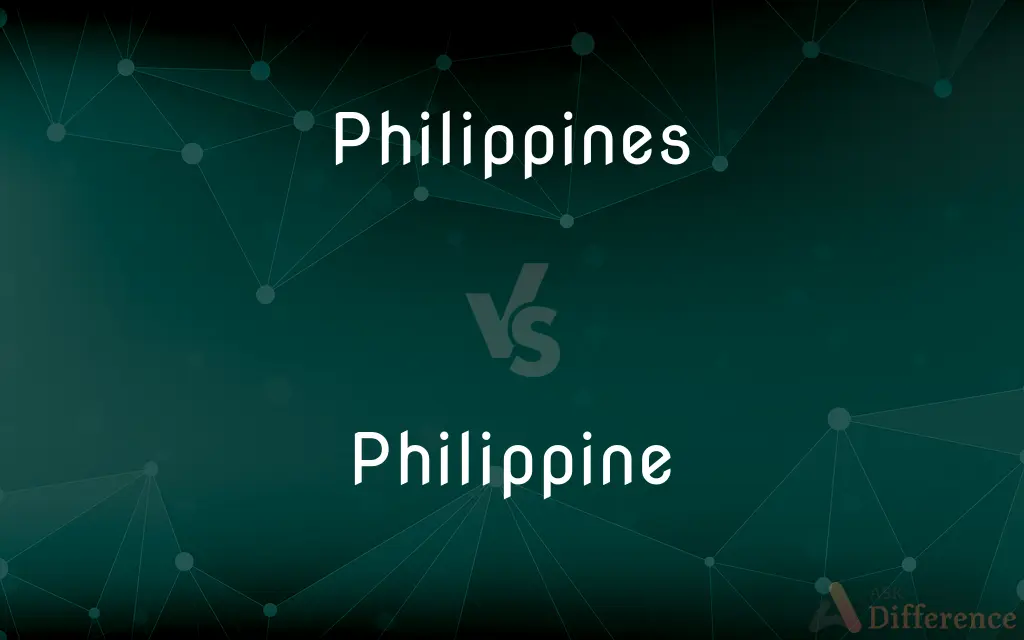Philippines vs. Philippine — What's the Difference?
Edited by Tayyaba Rehman — By Maham Liaqat — Updated on March 13, 2024
"Philippines" refers to the Southeast Asian country, while "Philippine" is an adjective describing something related to the Philippines.

Difference Between Philippines and Philippine
Table of Contents
ADVERTISEMENT
Key Differences
The Philippines is a country in Southeast Asia, known for its archipelago of over 7,000 islands, rich biodiversity, and vibrant culture. It is a sovereign state that boasts a diverse blend of history, traditions, and languages, with Filipino and English as its official languages. On the other hand, "Philippine" is used as an adjective to describe anything related to the Philippines, such as the Philippine culture, Philippine cuisine, or Philippine government. This distinction highlights the difference between using the term as a noun to identify the country and as an adjective to describe its various attributes.
When talking about the country itself, its people, or its nationality, "Philippines" is used, often in phrases like "the Philippines is home to..." or "the people of the Philippines." This usage signifies the country's identity and its collective aspects, including its inhabitants. Conversely, "Philippine" modifies nouns to attribute them to the country, emphasizing the origin or characteristic nature of the subject, such as in "Philippine history" or "Philippine islands," indicating something specific to or characteristic of the Philippines.
The cultural and natural richness of the Philippines is often celebrated in expressions like "Philippine festivals" or "Philippine landscapes," which showcase the country's unique attributes. These instances use the adjective form to highlight aspects that are distinctly Philippine in nature, further distinguishing between the country's name and its descriptive usage.
In terms of governance and official matters, one might refer to "Philippine laws" or "the Philippine government," which again employs the adjective form to specify that these entities are related to or governed by the Philippines. This usage is crucial in legal, educational, and international contexts where specificity about the country’s official matters is necessary.
"Philippine languages" refers to the languages spoken in the Philippines, including Filipino, which is based on Tagalog, and English, among others. This illustrates the use of "Philippine" as an adjective to describe the diverse linguistic landscape of the country, emphasizing the variety and cultural richness found within the Philippines.
ADVERTISEMENT
Comparison Chart
Definition
A Southeast Asian country comprising over 7,000 islands.
Adjective describing something related to the Philippines.
Usage
Refers to the country or its people as a whole.
Modifies nouns to denote relation to the Philippines.
Examples
"The Philippines has a vibrant culture."
"Philippine cuisine is diverse and flavorful."
Contexts
Used in general references to the country, its people, and nationality.
Used when describing attributes, qualities, or entities related to the country.
Language
Used to name the country in both formal and informal contexts.
Used to describe the language, culture, governance, etc., associated with the country.
Compare with Definitions
Philippines
A country in Southeast Asia with a rich cultural heritage.
The Philippines is known for its beautiful beaches and warm hospitality.
Philippine
Reflecting the cultural, social, or political aspects of the Philippines.
The Philippine government has launched new environmental initiatives.
Philippines
Comprised of over 7,000 islands, each with its unique charm.
Boracay and Palawan in the Philippines are famous tourist destinations.
Philippine
Pertaining to or characteristic of the Philippines or its people.
Philippine mangoes are renowned for their sweetness.
Philippines
Has Filipino and English as its official languages.
In the Philippines, government proceedings are conducted in both Filipino and English.
Philippine
Used to describe the diverse languages spoken in the country.
Philippine languages include Tagalog, Cebuano, and Ilocano, among others.
Philippines
Celebrates a diverse mix of indigenous and foreign influences.
The Philippines has a vibrant festival culture celebrating its history and diversity.
Philippine
Related to the country’s rich biodiversity and natural resources.
Philippine eagle, one of the world’s largest eagles, is endemic to the country.
Philippines
Home to a democratic government and a growing economy.
The Philippines is striving to improve its economy through technology and tourism.
Philippine
Denoting the cuisine that combines Asian and Spanish flavors.
Philippine cuisine offers a wide range of flavors from adobo to sinigang.
Philippines
The Philippines ( (listen); Filipino: Pilipinas or Filipinas), officially the Republic of the Philippines (Filipino: Republika ng Pilipinas), is an archipelagic country in Southeast Asia. It is situated in the western Pacific Ocean, and consists of about 7,640 islands, that are broadly categorized under three main geographical divisions from north to south: Luzon, Visayas, and Mindanao.
Philippine
Alternative spelling of Philippine
Philippines
A republic on the Philippine Islands; achieved independence from the United States in 1946
Philippine
Official language of the Philippines; based on Tagalog; draws its lexicon from other Philippine languages
Philippines
An archipelago in the southwestern Pacific including some 7000 islands
Philippine
Of or relating to or characteristic of the Philippines or its people or customs;
The Philippine President
Our Filipino cook
Common Curiosities
What is the official language of the Philippines?
The Philippines has two official languages: Filipino (based on Tagalog) and English.
Are "Philippines" and "Philippine" interchangeable?
No, "Philippines" is a noun referring to the country, while "Philippine" is an adjective describing something related to the country.
What is a famous Philippine dish?
Adobo is a famous Philippine dish known for its savory marinade.
Can "Philippine" be used to describe the people of the Philippines?
Yes, but in the form of "Philippine people" or "the Philippine population."
Can "Philippine" refer to the country's geography?
Yes, when talking about the country's islands, beaches, or natural landmarks.
What is unique about Philippine festivals?
Philippine festivals are celebrated with vibrant costumes, dances, and food, reflecting the country's rich history and traditions.
Is English widely spoken in the Philippines?
Yes, English is widely spoken in the Philippines and is one of the official languages.
What makes Philippine cuisine unique?
Philippine cuisine is a blend of Asian and Spanish influences, offering a variety of flavors and dishes.
How many islands are there in the Philippines?
The Philippines is composed of over 7,000 islands.
What are "Philippine laws"?
Philippine laws refer to the legal statutes and regulations that govern the Philippines.
What is a common tradition in the Philippines?
One common tradition in the Philippines is the celebration of fiestas in honor of patron saints.
How does the Philippine government operate?
The Philippine government operates as a democratic republic with three branches: executive, legislative, and judicial.
How is "Philippines" used in a sentence?
"The Philippines is a popular destination for its beaches and islands."
How is "Philippine" used in a sentence?
"Philippine history is a fascinating mix of indigenous cultures and colonial influences."
What symbolizes the Philippine nation?
The Philippine flag symbolizes the country’s independence, history, and patriotism.
Share Your Discovery

Previous Comparison
Contain vs. Content
Next Comparison
Parchment vs. ScrollAuthor Spotlight
Written by
Maham LiaqatEdited by
Tayyaba RehmanTayyaba Rehman is a distinguished writer, currently serving as a primary contributor to askdifference.com. As a researcher in semantics and etymology, Tayyaba's passion for the complexity of languages and their distinctions has found a perfect home on the platform. Tayyaba delves into the intricacies of language, distinguishing between commonly confused words and phrases, thereby providing clarity for readers worldwide.














































